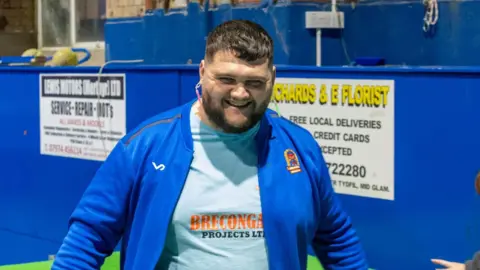'Going to A&E is unbearable for my autistic son'
 Robert Cummings
Robert CummingsA man has said A&E departments are "unbearable" and "terrifying" for his autistic son due to the overwhelming sensory environment they create.
Robert Cummings, 49, from Merthyr Tydfil, has spent many "stressful" hours in hospital with his six-year-old son Ellis, who becomes distressed by the "bright lights, loud noises, and unfamiliar faces".
His experiences have inspired him to fundraise to help open Wales' first immersive sensory room at the children's A&E department in Prince Charles Hospital in Merthyr Tydfil.
James Radcliffe, from the National Autistic Society, said autism-friendly hospital spaces were "essential", as standard settings can be distressing and risk misdiagnosis.
Ellis was diagnosed with autism at the age of four, which Mr Cummings described as a "difficult period".
The youngest of four boys, Ellis is "quiet" unlike his "boisterous, rugby-playing brothers" and has been admitted to Prince Charles Hospital's A&E department eight times due to recurring infections.
As he is non-verbal, Ellis finds unfamiliar environments "extremely stressful" and the chaos of A&E often leaves him "anxious, frightened, and misunderstood".
Mr Cummings said: "While the doctors and nurses do their best, they don't always have the resources to help him feel safe.
"It's devastating to watch, knowing he's not only dealing with a medical issue but also a barrage of overwhelming sensory input that worsens his anxiety."
Mr Cummings added the stress does not just affect children but also places "massive pressure" on families who must try to keep them calm in already-difficult circumstances.
"Every time we take Ellis to A&E, we face a heartbreaking struggle to soothe him as he encounters a world he doesn't understand," he said.
 Robert Cummings
Robert CummingsMr Cummings was inspired to start his fundraiser after one of Ellis' visits to A&E.
When he became anxious and overwhelmed, nurses took him to a quiet room with a lamp which helped him calm down and made the experience "so much more manageable" for Mr Cummings and his wife.
Moved by this, Mr Cummings spoke with a paediatric doctor in the department and together they came up with the idea of creating an immersive room - a multi-sensory space that uses technology to simulate real or imagined environments, helping children with Additional Learning Needs (ALN) feel more at ease and engaged.
He added: "No parent should have to watch their child suffer because the environment around them is too overwhelming.
"Every neurodivergent child deserves a place where they can feel calm, grounded, and understood, especially in a medical setting."
James Radcliffe from the National Autistic Society said hospitals can be "overwhelming" for autistic people with "bright lights, noise, and uncertainty" triggering distress that is "not just uncomfortable, but clinically risky".
Mr Radcliffe added: "Miscommunication or misinterpretation of a situation or medical symptoms can lead to missed or incorrect diagnoses.
"That's why autism-friendly spaces in A&E aren't a luxury - they're essential."
While the charity is excited about Wales' first immersive room, Mr Radcliffe said he urges the Welsh government to "have the ambition of ensuring all health and care settings become autism-friendly".
 Greenfield Special School
Greenfield Special SchoolA similar immersive room already exists at Greenfield Special School in Merthyr Tydfil, which Mr Cummings hopes to replicate.
Built in March 2023 for the school's 205 pupils, it was funded jointly by the National Lottery and community fundraising.
Alison Hammer, the school's family liaison officer, said the room offers children experiences they might not otherwise have, such as visiting hospitals, airports and hairdressers.
She added the room is used as part of the pupils' daily schedule as it helps with motor skills and communication as they can tap the screen or stamp on the floor.
Ms Hammer said she was "over the moon" to hear about Mr Cummings' plans.
"Lots of our children spend a lot of time in hospital and the A&E department so this will be amazing for them," she said.
"The children will be familiar with the room so it should make the process so much easier."
 Google
GooglePrince Charles Hospital has found a space within the paediatrics A&E department for the immersive room, but it will cost £27,000 to install.
The Cwm Taf Morgannwg NHS Charity has committed to covering half the cost, but Mr Cummings is raising the remainder, which he has almost achieved through a series of community fundraising events.
"I just want to create an inclusive, compassionate space that will bring comfort to so many families like mine," Mr Cummings said.
 Luke Palmer
Luke PalmerLuke Palmer, co-founder of Diversity Dragons sports group for children with ALN in Merthyr Tydfil, said the immersive room will "help so many children in the area".
The club, run entirely by volunteers, creates a supportive environment where children can try different sports and help families connect - "without eyes on them".
"I just think how amazing would it be for any child who is upset and overwhelmed to be able to go into a room and regulate themselves," he added.
Mr Palmer said facilities like this are "invaluable" for helping children prepare for medical experiences and feel "safe, regulated, and included".
Abe Sampson, from Cwm Taf Morgannwg University Health Board said it was "delighted" to support the "incredible" project, which will be the first of its kind across local emergency departments.
The Welsh government said it "strives to make hospital and care settings accessible to everyone".
"We have been clear that all patients, including neurodivergent people and those with mental health needs, should receive a timely, coordinated assessment," a spokesperson said.
It added health boards must reduce harm risks in emergency departments by ensuring accessible environments, reasonable adjustments, and smoother hospital-to-community transitions.
